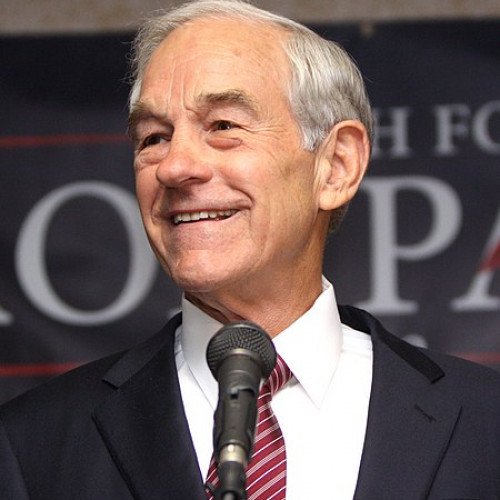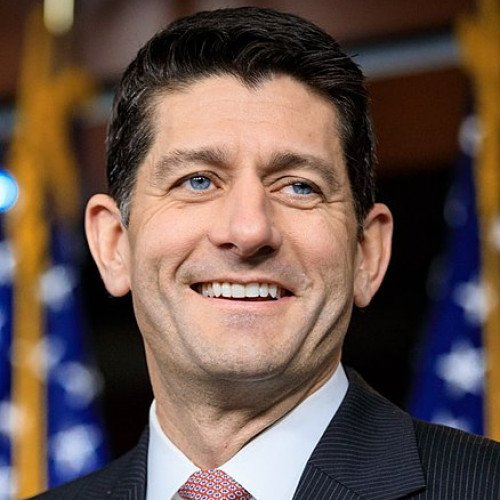Ron Paul VS Paul Ryan

Ron Paul
Ronald Ernest Paul (born August 20, 1935) is an American author, physician, and retired politician who served as the U.S. Representative for Texas's 22nd congressional district from 1976 to 1977 and again from 1979 to 1985, and for Texas's 14th congressional district from 1997 to 2013. On three occasions, he sought the presidency of the United States: as the Libertarian Party nominee in 1988 and as a candidate in the Republican primaries of 2008 and 2012. A self-described constitutionalist, Paul is a critic of the federal government's fiscal policies, especially the existence of the Federal Reserve and the tax policy, as well as the military–industrial complex, the war on drugs, and the war on terror. He has also been a vocal critic of mass surveillance policies such as the USA PATRIOT Act and the NSA surveillance programs. He was the first chairman of the conservative PAC Citizens for a Sound Economy, a free-market group focused on limited government, and has been characterized as the "intellectual godfather" of the Tea Party movement, a fiscally conservative political movement that is largely against most matters of interventionism.Paul served as a flight surgeon in the U.S. Air Force from 1963 to 1968, and worked as an obstetrician-gynecologist from the 1960s to the 1980s. He became the first Representative in history to serve concurrently with a child in Congress when his son, Rand Paul, was elected to the U.S. Senate from Kentucky in 2010. Paul is a Senior Fellow of the Mises Institute, and has published a number of books and promoted the ideas of economists of the Austrian School such as Murray Rothbard, Friedrich Hayek, and Ludwig von Mises during his political campaigns. After the popularity of his 2008 presidential bid, Paul announced in July 2011 that he would forgo seeking another term in Congress in order to focus on his 2012 bid for the presidency. Finishing in the top four with delegates in both races (while winning four states in the 2012 primaries), he refused to endorse the Republican nominations of John McCain and Mitt Romney during their respective 2008 and 2012 campaigns, and on May 14, 2012, Paul announced that he would not be competing in any other presidential primaries but that he would still compete for delegates in states where the primary elections had already been held. At both the 2008 and 2012 Republican National Conventions, Paul received the second-highest amount of delegates behind only McCain and Romney respectively. In January 2013, Paul retired from Congress but still remains active on college campuses, giving speeches promoting his libertarian vision. He also continues to provide political commentary through The Ron Paul Liberty Report, a web show he co-hosts on YouTube. Paul received one electoral vote from a Texas faithless elector in the 2016 presidential election, making him the oldest person to receive an electoral vote, as well as the second registered Libertarian presidential candidate in history to receive an Electoral College vote, after John Hospers in 1972.
Statistics for this Xoptio

Paul Ryan
Paul Davis Ryan (born January 29, 1970) is a retired American politician who served as the 54th speaker of the United States House of Representatives from October 2015 to January 2019. He was also the 2012 vice presidential nominee of the Republican Party, running unsuccessfully alongside Mitt Romney. Ryan, a native of Janesville, Wisconsin, graduated from Miami University in 1992. He spent five years working for Republicans in Washington, D.C. and returned to Wisconsin in 1997 to work at his family's construction company. Ryan was elected to Congress to represent Wisconsin's 1st congressional district the following year, replacing an incumbent Republican who ran for U.S. Senate. Ryan would represent the district for 20 years. He chaired the House Budget Committee from 2011 to 2015 and briefly chaired the House Ways and Means Committee in 2015 prior to being elected Speaker of the House in October 2015 following John Boehner's retirement. A self-proclaimed deficit hawk, Ryan was a major proponent of Social Security privatization in the mid-2000s. In the 2010s, two proposals heavily influenced by Ryan—"The Path to Prosperity" and "A Better Way"—advocated for the privatization of Medicare, the conversion of Medicaid into a block grant program, the repeal of the Affordable Care Act, and significant federal tax cuts. As Speaker, he had a role in passage of the Tax Cuts and Jobs Act of 2017. His other major piece of legislation, the American Health Care Act of 2017, passed the House but failed in the Senate by one vote. Despite his past fiscal conservative rhetoric, Ryan's tenure as Speaker of the House—most of which coincided with a period of unified Republican control of the federal government—saw a significant increase in federal government spending and deficits. Ryan declined to run for re-election in the 2018 midterm elections. With the Democratic Party taking control of the House of Representatives, Nancy Pelosi succeeded Ryan as Speaker of the House.